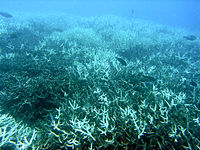
Photo from wikipedia
Echinochloa colona (junglerice) is a problematic global weed for many crops, primarily controlled with herbicides. Drought stress alters the overall plant physiology and reduces herbicide efficacy. This research aimed to… Click to show full abstract
Echinochloa colona (junglerice) is a problematic global weed for many crops, primarily controlled with herbicides. Drought stress alters the overall plant physiology and reduces herbicide efficacy. This research aimed to study the joint effect of drought stress (DS) and recurrent selection with sublethal dose of herbicide on adaptive gene expression and herbicide efficacy on E. colona. Three factors were evaluated: (A) E. colona generation (G0, original population from susceptible standard; G1 and G2, progenies of recurrent selection); (B) herbicide treatment (florpyrauxifen-benzyl, 0.25×; glyphosate, 0.125×; quinclorac, 0.125× the recommended dose; and nontreated check); (C) DS (50% and 100% field capacity). Recurrent exposure to sublethal herbicide dose, combined with drought stress, favors the selection of plants less susceptible to the herbicide. Upregulation of defense (antioxidant) genes (APX: ascorbate peroxidase), herbicide detoxification genes (CYP450 family: cytochrome P450), stress acclimation genes (HSP: heat-shock protein, TPP: trehalose phosphate phosphatase, and TPS: trehalose phosphate synthase), and genes related to herbicide conjugation (UGT: UDP glucosyltransferase) in the G2 population was significant. Recurrent exposure to sublethal herbicide dose under drought stress reduces junglerice sensitivity to herbicide, seemingly due to “imprinted” upregulation of metabolic and protection genes in response to these stresses.
Journal Title: Agronomy
Year Published: 2020
Link to full text (if available)
Share on Social Media: Sign Up to like & get
recommendations!